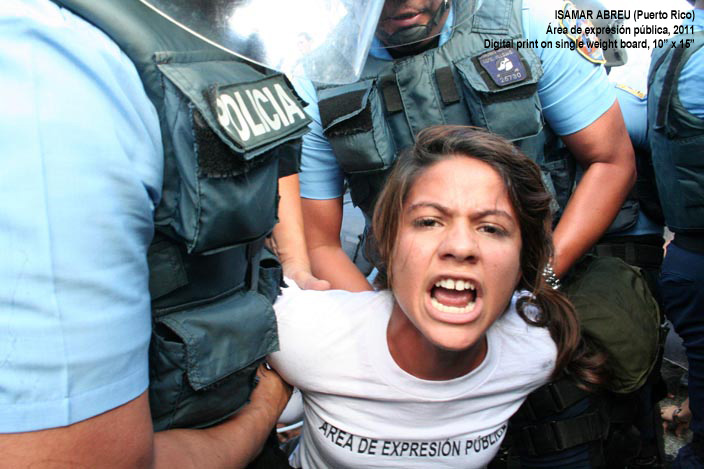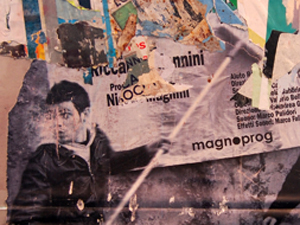In this text I revisit a multi-venue exhibition I co-curated with Susan Richmond, a professor of Art History at Georgia State University and independent curator Cathy Byrd. “Losing Yourself in the 21st Century” explored how contemporary women artists articulate notions of gendered subjectivity through new media in a social context where notions of a singular and stable self are constantly undermined through the now widespread negotiation of multiple identities that people experience online. We developed a blog that was utilized as a call for participation for the exhibition and also as a platform through which we could engage in dialogue with the artists and for the artists to respond to each other’s work. The blog also served as a particularly useful tool for a feminist project such as Losing Yourself, as it afforded transparency to the collaborative curatorial process. We selected thirteen artists to feature in exhibitions at the Welch Gallery at Georgia State University in Atlanta (October–December 2009) and Maryland Art Place in Baltimore (February–March 2010). The artists included were Ali Prosch, Susan Lee Chun, Katherine Behar, Pamela Phatsimo Sunstrum, Amber Hawk Swanson, Noelle Mason, Saya Woolfalk, kate hers, Shana Moulton, Amber Boardman, Stacia Yeapanis, Renetta Sitoy, and Milana Braslavsky.
Special Sections
Special sections published within or across issues.
In Search of a www.analogfeminism.net: Starting with Three Contrarian Concepts via Mother-Daughter Machines to Come
Analog feminism (AF) and digital feminism (DF) are two sides of the same coin; or, multiple twin sisters joined at the hip. Skating from René Descartes to Kara Walker, she asks us “to go gray between zeroes and ones.” Reverting from the digital to its ancestral digit, a finger, Lee uses text and textuality to point out a multiplicity of directions, all of which refrain from a directive. In a series of “posts” negotiating, inheritance, reference, and influence, the daughter searching for the mother returns to sender. Whatever the case, we, or at least one of us, are here to focus on and fly with what’s left uncoordinated in—and connecting—all that’s (to be) digit-alled in the evolving idioms of feminist discourses.
Manifestos, an Introduction
Because the manifesto was written to spark a dialogue rather than advance a particular program, we have chosen to present it here as part of a dossier of interrelated documents produced by youth-oriented communities struggling against global systems of exploitation and oppression. Whether produced in the barricades of Río Piedras or the reclaimed streets of Cairo, these calls to action and understanding critique intersecting systems of exploitation and gesture to points of solidarity and coalition-formation. In doing so, they open up spaces for imagining new futures and they create the conditions in which such a future may indeed come to pass.
Declaration of the Occupation of New York City
As we gather together in solidarity to express a feeling of mass injustice, we must not lose sight of what brought us together. We write so that all people who feel wronged by the corporate forces of the world can know that we are your allies.
Solidarity Statement From Cairo
To all those in the United States currently occupying parks, squares and other spaces, your comrades in Cairo are watching you in solidarity. Having received so much advice from you about transitioning to democracy, we thought it’s our turn to pass on some advice.
Ocúp(arte): The Humanities Manifesto
Statement of occupation of the Humanities Action Committee, University of Puerto Rico, Río Piedras
We Are Many Youth, But With One Struggle!
A worldwide economic crisis exploded in 2008 that has been deeply consequential. This crisis can be only compared to the 1929 crisis. Powerfully striking at the core of the system, first it shook the United States and now it is developing more intensely in Europe. However, the effects of the crisis can be seen all over the world.
Pedagogy for Our Future
A liberatory UC, run by and for all the people, is not only possible—it is a critical part of a planetary youth movement that is enacting true democracy in public squares and parks. We have faith that the weapons at our disposal will allow us to play our part. We have faith that these weapons will allow us to peacefully tear down the old edifice and build this new university from the ground up. Our pedagogy is our main weapon, and on a daily basis, we see that it is neither blunt nor ineffective. These are our main pedagogical principles—intuitions more than ideologies, bonds more than guidelines, dreams rather than demands. These principles aim at cracking through the crumbling structure of the university at its base. Through these principles, we will take part in a guerrilla campaign to bring all of the people back into the university.
smartAction
Images from an art exhibition inspired by the 2010–2011 University of Puerto Rico student Movement.
La Performatividad Colectiva como Arte Publico: Acción dentro de la Huelga de la Universidad de Puerto Rico / Collective Performance as Public Art: Action inside the University of Puerto Rico’s Strike
In April 2010, the University of Puerto Rico experienced a moment of political convulsion due to a series of measures and budget cuts that the administration tried to implement. These events moved the students to demand a reason for these budget cuts. After not getting any clear or valid answers from the administration, the student body organized a series of protests that lead to an almost two-month long strike. My paper is mainly focused on the artistic manifestations that resulted from the strike. These, from our perspective, can easily ft into what is considered public art, may them be intended as such or not, because they transform the street into a place of dialogue and relationships.
Culture Industries: Critical Interventions
This thread presents a different agenda for studying culture and the culture industries in particular, one that is grounded in a distinctly cultural studies materialist reflexivity. Cultural studies is probably best understood as the politically committed, theoretically grounded, and radically self-reflexive and historical-materialist analysis of cultural processes and practices, where the commitment to imagine a humane, socialist society has always been a guiding assumption in the field from its early formations in post-war Britain.
“Nothing gold can stay:” Labor, Political Economy, and the Birmingham Legacy of the Culture Industries Debate
Over the course of the last 150 years or so, we can see three distinct phases of the culture industry. More specifically, there have been (at least) three eras marked by different configurations of the relationship between culture, politics, the dominant mode of production and the commodification of culture. Cultural Studies emerged from the second era, whose contours I’ll explore here; and we are now in a liminal phase brought on by the uncertain conflagration between the neoliberalism, convergence culture, and nascent popular uprisings under the banner (and hashtag) #occupyeverywhere. This third phase, or conjuncture, once again reconfigures these relations, making it important to revise the theoretical assumptions and political strategies that were adhered to in an earlier era of “the culture industry.” I will outline the direction I think this points to both in our understanding of the culture industries and in terms of political and theoretical strategy going forward.
Distributed Centralization: Web 2.0 as a Portal into Users’ Lives
Web 2.0 as a whole is beginning to take a decidedly interconnected shape. Facebook, Google, YouTube, Wikipedia, Blogger, Twitter and other Web 2.0 sites are linked to one another in a complex and bewildering array of Application Programming Interfaces (APIs), user-created applications, links, protocols, and browser extensions. To trace these connections, this paper draws on the intersection between computing, software engineering, and the management of labor in informational capitalism to uncover an architectural model with which to understand this complexity: the portal model. We will see how the interconnections between Web 2.0 sites, built on de facto protocols, is creating the Web as Portal, an architecture built to capture value produced by users, value that was previously hidden as unstructured data. Web 2.0 as a portal is rife with contradictions: on the one hand, the Web (and Internet) remain distributed networks, and Web 2.0 applications could easily be mapped as distributed. On the other hand, extremely popular sites such as Facebook (for social networking) and Google (for search), as well as the increasing interconnection between them, are rendering Web 2.0 to be a centralized network. This distributed centralization is part of the larger portal architecture, wherein heterogeneous sites are articulated into a network of networks.
Introduction: Mobilisations, Interventions, and Cultural Policy
There are four themes that weave their way through the research thread on Mobilisations, Interventions, and Cultural Policy in this issue. First, there is concern with intervention—intervention into the politics and practices of social movements and intervention into the academy and its traditions of knowledge production. Second, each text is situated firmly within a recognition and appreciation of social movements as knowledge producers. Third, all three contributions are unequivocally located in an urban context and the contemporary condition of inhabiting the city. Finally, what emerges from each reflection is a commitment to militant research and practice, as one that keeps ever-present an awareness of the relationship of research to existing material social relations of power and a commitment to confronting and transforming these very relations.
Urban Interventions / Intervenzione Urbane
Urban Interventions is a series of collages by Alexander Dellantonio that take the urban terrain with its rapid changes as the matrix of inquiry, presenting the artists reflections on the city. The strong colours used by the artist echo the city’s images, places, people and situations and tattered billboard posters and manifestos torn off the buildings the militants fly-posted them on are reassembled to show the city and its inhabitants in movement. Dellantonio appropriates parts of the city and seeks to return them to the spectator. In so doing, these works not only engage the urban terrain as a space of politics, they also raise questions about mediation in the context of the current crisis of political representation that is being expressed by movements across the world, whether for example in Tahrir or Syntagma Square, at Occupy Wall Street or during the public sector strikes in the UK.


